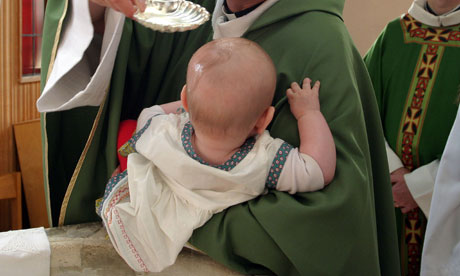The Rev George Gebauer says he feels sorry for gay people and believes there is something wrong with their make-up

A vicar would not allow a lesbian couple to be both named as mother on the register of their son's baptism. Photograph: Elly Godfroy / Alamy/Alamy
A British vicar has refused to allow a lesbian couple to both be named as mother on the register of their child's baptism and claimed there was something wrong with the make-up of gay people.
The Rev George Gebauer argued that it would be illegal for both women to be recorded as the one-year-old boy's mother even though both have legal parental responsibility.
He went on to say he felt sorry for gay and lesbian people. "They produce too much hormone — they're imbalanced," he said. "That's the way they are. It's a medical issue."
After the vicar's stance became public, a more senior Church of England cleric stepped in to say that both women – the child's biological mother, Aimi Leggett, and her civil partner, Victoria Leggett – could after all be named as mothers to the child, Alfie, and the baptism would go ahead.
Aimi, 25, and Victoria, 22, had arranged the baptism at St Mary's churchin Warsash, Hampshire, with a previous vicar, but he left before the ceremony could take place. Retired clergy, including Gebauer, 87, are officiating until a replacement can be found.
When the Leggetts went to meet Gebauer he insisted one of them would have to be godmother, claiming the church register only had space for one mother and one father.
The pair promptly left the meeting deeply upset. Aimi, from Gosport, said: "There was no way one of us was going to be listed as the godparent. We are both Alfie's mum."
Aimi, who was herself baptised at St Mary's, said: "Rev Gebauer sat there and told us no child could have parents of the same sex, no child could have two mothers."
When he was questioned on Tuesday about his stance, Gebauer argued he did not refuse to baptise Alfie and the couple's sexuality was not an issue.
"However, when it came to the administrative side of things they insisted on both being listed as mum and refused to budge from their position," he said. "I told them I was unable to do this because the church baptism register only has space for one mother and one father. I believe it would be illegal for me to register them both as mother.
"This is nothing to do with their sexuality. The soul of the little boy is more important than anything else. We did not even push them for the name of the father, we were happy to leave that space blank."
He went on to say he felt sorry for gay people: "We know there is something not right within their make-up."
Later, one of the archdeacons of the Portsmouth diocese, the Ven Gavin Collins, intervened. He said: "Having spoken to Aimi Leggett, I'm pleased to report that the baptism of Alfie will go ahead at St Mary's church. We have addressed the legal issue.
"As I understand it, her partner, Victoria, has full legal co-parental responsibility for Alfie. We can therefore enter their details on to the baptism register as 'mother' and 'mother', as they would like."
Aimi, a design student, became pregnant with the use of an anonymous sperm donor. Alfie's birth certificate lists Aimi as mother but the father space remains blank.
She has been in a relationship with Victoria, a law student, for four years. They entered a civil partnership in October 2011 and the courts have given Victoria the same parental rights as Aimi. Formal adoption papers are being processed.
Gebauer will not be carrying out the baptism.
Source: theguardian.com
